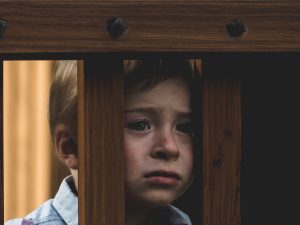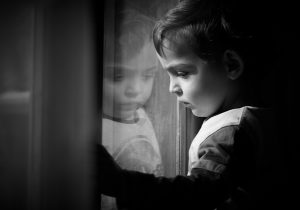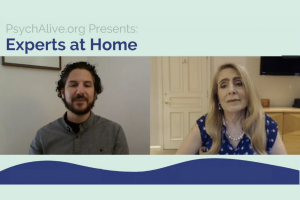How Do Adverse Childhood Events Impact Us?
 …And can positive childhood events provide protection?
…And can positive childhood events provide protection?
In the 1980s, Dr. Vincent Felitti, a physician from Kaiser Permanente was running an obesity clinic through the Department of Preventive Medicine. After several years, much to Felitti’s puzzlement, more than half of the people participating had dropped out despite successfully losing weight. Determined to find out why, Felitti eventually stumbled upon a troubling finding: many of the participants who dropped out had suffered childhood trauma. Their struggles with obesity were directly related to this early trauma, and therefore, losing weight was more than just a physical issue.
Felitti’s discovery set in motion an eventual partnership between Kaiser and the Centers for Disease Control in conducting one of the largest investigations of adverse childhood experiences (ACEs) and health and well-being later in life. Their study would go on to find a strong graded relationship between the breadth of ACEs (childhood abuse, neglect, and household challenges) a person experiences and multiple risk factors for most of the leading causes of death in adults.
With the stakes being so high, the subject of ACEs has started to enter more forcefully into conversations around mental and physical health. Just this year, Kaiser announced it will invest $2.75 million into research on preventing and mitigating the health effects of ACEs. Enhancing our understanding and spreading the word about prevention and intervention can help us facilitate a healthier path forward. The first step is learning more about both adverse and positive childhood experiences (PCEs) and how they impact people throughout their lives.
Adverse childhood experiences are potentially traumatic events that take place in childhood before age 17. They can include physical, sexual, or emotional abuse, physical or emotional neglect, or family dysfunction such as addiction, incarceration, mental illness, domestic violence, or divorce. A person’s ACE score can be determined by answering a series of fact-based questions, carefully worded so as not to be subjective. There is even a quiz you can take online to learn your ACE score.
Research has shown that the higher a person’s ACE score is, the more it can go on to affect their mental and physical health. In fact, a higher score is associated with health risks like severe obesity, diabetes, depression, suicide attempts, STDs, heart disease, cancer, stroke, COPD, and broken bones. It also correlates with higher risk for behaviors like smoking, alcoholism, drug use, lack of physical activity, and missed work.
While it is incredibly painful to picture any child experiencing any form of trauma, nearly two-thirds of adults are reported to have at least one ACE. In response to this alarming rate, researchers have been exploring not just the reduction of ACEs but the promotion of positive childhood experiences (PCEs). One recent study by Christina Bethell, a professor and researcher at the Johns Hopkins Bloomberg School of Public Health showed that higher counts of positive childhood experiences (PCEs) were associated with 72 percent lower odds of having depression or poor mental health overall as an adult. Those with higher levels of positive experiences were also more than 3.5 times more likely to have all the social and emotional support they needed as an adult.
The study concluded that assessing and promoting PCEs may reduce adult mental and relational health problems in a person even when they experienced ACEs. As Bethell put it when asked what lessons should be taken from her findings, “Every moment matters. Every interaction with a child has a reaction in that child. Even as we keep working to address the many social and cultural factors we need to address to prevent negative experiences, we should be focused on proactive promotion of the positive.”
The idea that there are protective factors to help build resilience and moderate the long-term impact of ACEs is a hopeful one, and it’s being validated by research. One 2018 study published in the Journal of Child & Adolescent Trauma showed that “respondents exposed to four or more ACEs who grew up with an adult who made them feel safe and protected were less likely to report frequent mental distress or poor health.” The study concluded that “the use of protective factors may be an effective prevention strategy for ACEs and its associated outcomes and may serve as a mechanism to ‘break the cycle’ of childhood trauma.”
What this new research tells us is that the kind, attuned, and nurturing responses we have to children can have a crucial impact on their future, even when they’ve faced traumas involving other caretakers or figures in their lives. The relationships we form with children can be significant to mediating the effects of trauma, and this continues to be true throughout their lives.
In addition to making a child feel safe, stable, and nurtured, providing them with plenty of PCEs, there are interventions in adulthood that can be extremely beneficial to those affected by ACEs. Because a high ACE score can be an indication that a person may have unresolved trauma, the way to repair it is to make sense of what happened to them. Research shows that when we fail to face and process the large and small traumas of our past, we can become stuck in our pain and easily triggered, often without knowing why, into a reactive state by incidents in our present that bring up feelings from our past. Creating a coherent narrative can therefore be key component to trauma recovery.
Adults with ACEs can greatly benefit from learning techniques to enhance their resilience and by forming close relationships with caring people they can trust. They can seek mental health care, with trauma informed therapy being particularly effective in helping people resolve early pain. The most important message is that trauma doesn’t have to be a life sentence. People can find healing and support, and we can offer healing and support that can alter the course of or even save a person’s life.
Tags: child development, children, parenting, self development, self-understanding, trauma







